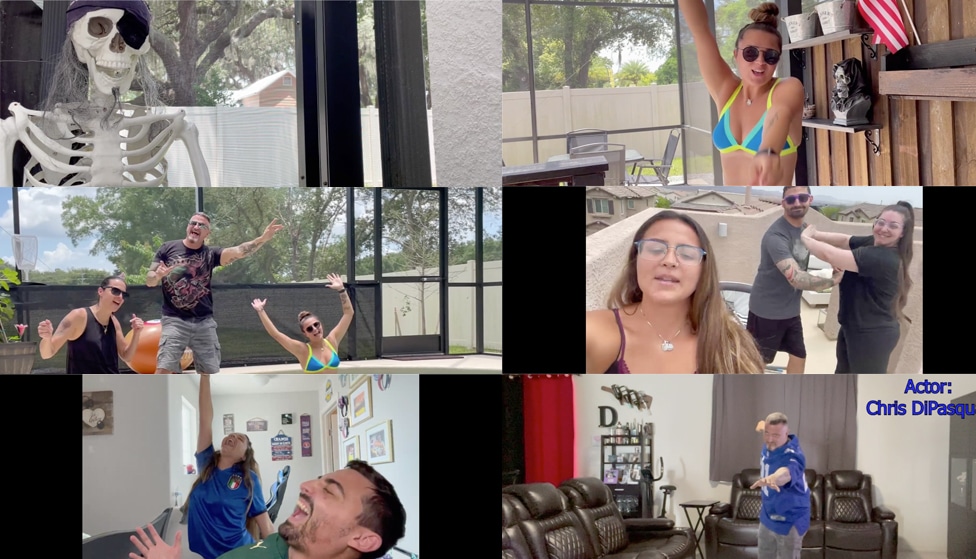DIG 209: Time-Based Media
Advanced projects in digital media and movie making
This creative online time-based media course explores storytelling and allows students to integrate 2D animation, 3D animation, motion graphics, and video in an advanced After Effects environment. You will emerge with both a solid grasp of movie making techniques and a varied portfolio including a commercial, movie credit sequence, a dramatic short story, a visual illustration of a complex idea, a movie trailer, and an abstract tone poem. The course will explore useful techniques for research, scripting, and storyboarding with reference to film, television, and Web-based movies.
 Student work by Chris DiPasquale.
Student work by Chris DiPasquale. Visit the Student Gallery.
About This Course
Project-Based Learning
Creative video production and editing projects include a movie trailer, an inspirational video, a
PSA video, and a music video.
What Skills Will I Develop?
Students in this course can expect to learn to:
- Apply conventions and development strategies for the following digital media genres: movie trailers, public service announcements, music videos, commercials, and short films.
- Develop an understanding of fundamental concepts for obtaining and retaining viewer attention.
- Apply the three-act story structure as a basic narrative device.
- Use conceptual thinking to solve artistic problems.
- Evoke feeling within narrative contexts using visual lexicons.
- Collect and organize inspirational sources with a reference library.
- Apply linear and iterative workflows to large creative projects.
- Use visual development strategies to translate written concepts into visual narratives.
- Develop an understanding of pipeline and R&D workflow strategies.
- Participate and collaborate in online digital media communities.
- Apply advanced techniques for timing, pacing, rhythm, and leading the viewer in digital media compositions.
- Develop an understanding of previsualization and revisualization techniques for project management.
What Software and Supplies Do I Need?
- Computer with Internet connection (broadband recommended).
- Adobe Photoshop, Premiere, After Effects, and Animate CC.
- Autodesk Maya (optional)
- Digital drawing tablet (such as a Wacom tablet) recommended.
- Access to a digital video camera and ability to connect it to a computer to capture footage.
- Basic experience in the above software and digital media skills.
Course Outline
Timing and Narrative Theory
What is time-based media, and what does it mean to you? You'll begin your course with an investigation of the difference between objectively measured time and time as it is experienced and represented in our media. We'll explore fundamental concepts for obtaining and retaining viewer attention and look at how it is implemented in such narrative devices as the three-act story and the movie trailer.
Reference, Inspiration, and the Concept
In a world full of original creation and endless variety, how do we differentiate ourselves from the pack? First by understanding where we are in the pack: identifying our skills, cataloging our references and inspirations, and thinking hard about our concepts. This lesson will focus on how to infuse projects with conceptual depth, emotion, and inspiration, working within constraints.
Visual Development and Planning
When you have big digital media projects ahead of you, you need to make sure that you aren't getting bogged down in the details of the work too early on. In this lesson we'll look at how iterative design workflows can help the creative process. We'll talk about how to translate scripts into a visual lexicon and address strategies for visual development.
Organizing Assets and Testing Pipelines
With a little bit of research, a well-organized suite of assets, and a throughly tested production pipeline, you can have a clear vision of how to synchronize your best ideas with your most practical solutions. That's what we're going to explore in this lecture, as we share experiences planning, shooting, and editing a music video for an iconic indie label.
Scene Setup and Execution
How far would you go to get a shot right? Or, to put it another way, how right does a shot have to be—the visuals, the sounds, the movement—to tell a story? In this lesson we will explore strategies for roughing out compositions and setting up cameras in both live action and animation. The use of primitives, color, key poses and silhouettes as well as sound editing will be discussed.
Editing and Working with Clients
In our final lecture, we're going to discuss the editing process (including how it blends into the critique and client communication process), but we're not really going to talk much about where to click in your non-linear editor of choice. Instead, we're going to focus on how you can edit your way to the best story possible.
Frequently Asked Questions (FAQ)
How Do The Courses Work?
Our courses are project-based and instructor-led. In each course you’ll complete a series of lectures, projects, discussions, and critiques designed to stretch your creative skills. Weekly assignment deadlines keep you on track, and with no set-logins or Zoom meetings, you can build your studies around your schedule.
Who Are The Instructors?
Our courses are developed and taught by our industry-leading faculty of creative professionals. This means that you’ll learn in-demand skills, get feedback on your work, and build a portfolio of creative work. View our Student Gallery for featured student projects.
When Can I Start?
Classes start January, April, and August, and this course is completed in a 15-week term. College credit from this course can be applied to a range of Degree and Certificate programs at Sessions College. You can enroll in this course on an individual basis or as part of a program.
Explore our Programs: Bachelor's Degree | Associate Degree | Undergraduate Certificate
How Do I Register?
To register for a program, complete our program application. To register for this course on an individual basis, please contact our admissions team at admissions@sessions.edu. An Admissions Advisor will contact you to setup your enrollment.
| Course Tuition and Fees | |
|---|---|
| Tuition | $510/credit |
| Registration Fee* | $200 |
| Total Course Price | $1730 |
Registration fees are nonrefundable after 5 days from enrollment.
Is Sessions College accredited?
Yes. Since 2001, Sessions College has been accredited by the Distance Education Accrediting Commission (DEAC). The Distance Education Accrediting Commission is listed by the U.S. Department of Education as a recognized accrediting agency and is recognized by the Council for Higher Education Accreditation (CHEA).
